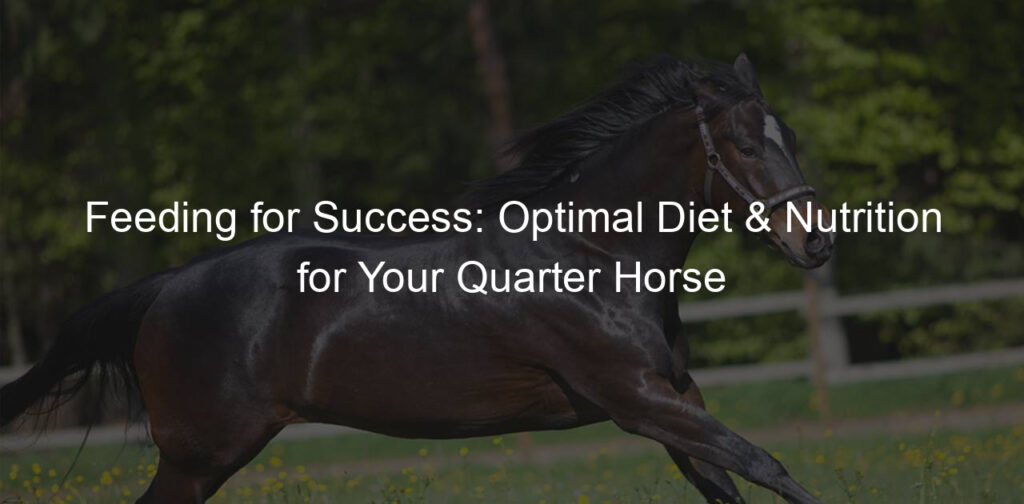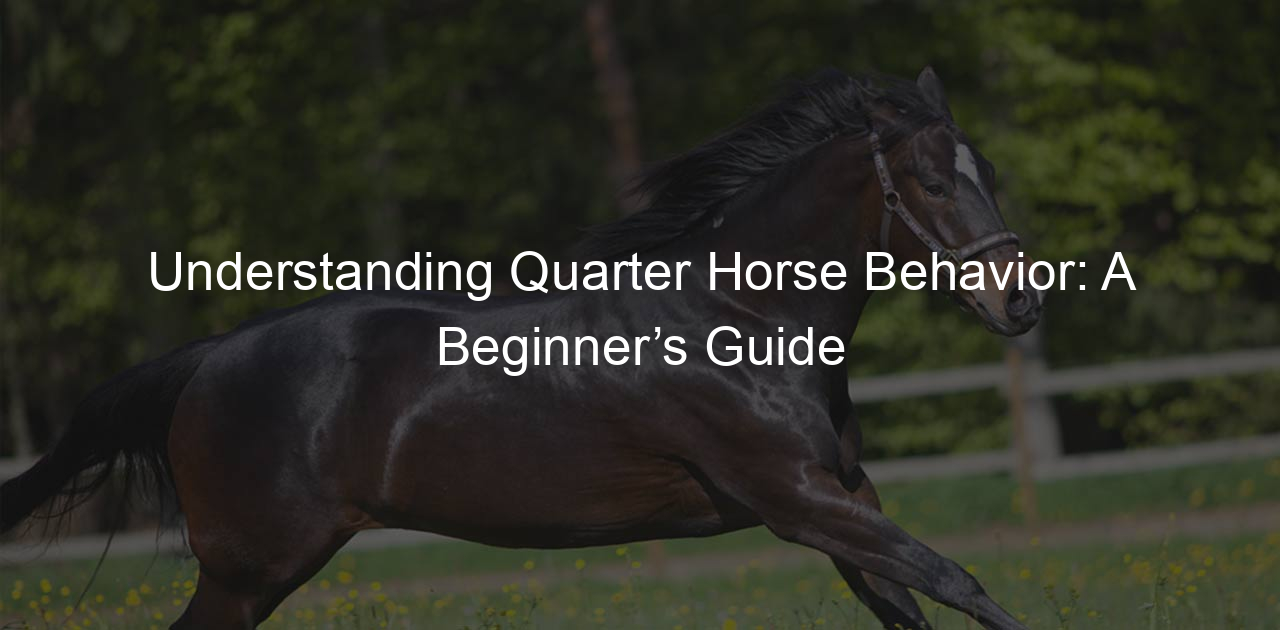Introduction to Quarter Horse Feeding Guidelines
Feeding a Quarter Horse properly is a crucial aspect of horse care. It’s not just about providing food, but ensuring that the horse receives the right nutrients in the correct proportions. In this section, we will explore the basics of horse nutrition and the importance of a balanced diet for Quarter Horses.
- Understanding the basics of horse nutrition
The first step in feeding your Quarter Horse correctly is understanding the basics of horse nutrition. Horses are herbivores, and their digestive system is designed to process plant-based foods. They require a variety of nutrients to maintain their health and performance, including carbohydrates, proteins, fats, vitamins, and minerals. You can learn more about horse nutrition on this Wikipedia page.
- Importance of a balanced diet for Quarter Horses
Just like humans, horses also need a balanced diet for optimal health. A balanced diet for a Quarter Horse includes the right amount of hay or pasture, grains, and supplements. The specific amounts will vary depending on the horse’s age, weight, activity level, and overall health. Feeding a balanced diet helps prevent nutritional deficiencies and health problems, and it also supports the horse’s performance and longevity.
Remember, every horse is unique, and what works for one may not work for another. It’s always best to consult with a veterinarian or a horse nutrition expert to create a tailored feeding plan for your Quarter Horse.
Nutritional Requirements for Quarter Horses
Understanding the nutritional needs of a Quarter Horse is crucial for its overall health and performance. This breed has specific dietary requirements that need to be met for them to thrive. Let’s delve into the essential nutrients that a Quarter Horse needs.
Essential Nutrients for Quarter Horses
There are four primary nutrients that are vital for Quarter Horses. These include:
- Protein
- Fats
- Carbohydrates
- Vitamins and Minerals
Protein is a critical nutrient for Quarter Horses. It aids in muscle development and repair, making it essential for horses that are active or in training. The recommended protein intake for a Quarter Horse is about 10-12% of their total diet.
Fats are a concentrated source of energy for horses. They help in maintaining a healthy coat and skin, and also support the absorption of fat-soluble vitamins. A diet with 5-7% fat is usually sufficient for a Quarter Horse.
Carbohydrates are the primary energy source for horses. They are found in forages, grains, and some commercial feeds. However, it’s important to monitor the intake as excessive carbohydrates can lead to health issues like laminitis.
Vitamins and minerals are necessary for various bodily functions such as bone development, blood clotting, and immune system function. They are typically supplied in adequate amounts in a balanced diet, but may need to be supplemented in some cases.
Remember, every horse is unique and their nutritional needs may vary based on factors like age, activity level, and health status. Always consult with a veterinarian or equine nutritionist to ensure your Quarter Horse’s diet is balanced and meets their specific needs.
Understanding the Horse’s Dietary Needs
Just like humans, horses have specific dietary needs that must be met for them to stay healthy and strong. Here, we will discuss three crucial aspects of a horse’s diet: energy requirements, water intake, and the importance of forage and roughage.
- Energy requirements
- Water intake
- Forage and roughage
Energy is vital for a horse’s daily activities and overall health. It’s derived from the carbohydrates, fats, and proteins in their diet. The energy requirement of a Quarter Horse may vary based on factors like age, activity level, and health status. For instance, a working horse may need more energy than a horse that is not as active. It’s crucial to balance the energy intake to prevent issues like obesity or malnutrition.
Water is an essential part of a horse’s diet. On average, a horse needs to drink between 5 to 10 gallons of water per day. This amount can increase depending on the weather and the horse’s activity level. Dehydration in horses can lead to serious health issues, so it’s important to ensure they have access to clean, fresh water at all times.
Forage and roughage, which include grasses and hay, should make up the bulk of a horse’s diet. They are vital for the horse’s digestive health and provide the necessary fiber. A horse should consume about 1-2% of its body weight in forage per day. For example, a 1000-pound horse should eat between 10 to 20 pounds of forage daily.
In conclusion, understanding and meeting your Quarter Horse’s dietary needs is crucial for its health and well-being. Always consult with a vet or an equine nutritionist to ensure your horse’s diet is balanced and nutritious.
Healthy Horse Diet: What to Feed Your Quarter Horse
Feeding your Quarter Horse with a balanced and nutritious diet is essential for their health and performance. Let’s explore the different types of horse feed suitable for Quarter Horses.
Types of Horse Feed for Quarter Horses
There are three main types of horse feed that are commonly used in the diet of Quarter Horses. These are:
- Hay
- Grains
- Supplements
Hay is a staple in the diet of Quarter Horses. It provides the necessary fiber for a healthy digestive system. The most common types of hay fed to horses are Timothy, Bermuda, and Alfalfa. Each type has its unique nutritional profile, so it’s essential to choose the one that best suits your horse’s needs.
Grains such as oats, corn, and barley are often used to provide additional energy to Quarter Horses, especially those involved in high-intensity activities. However, grains should be fed in moderation as excessive amounts can lead to digestive problems.
Supplements are used to fill any nutritional gaps in your horse’s diet. Common supplements for Quarter Horses include vitamins, minerals, and proteins. It’s important to consult with a veterinarian or a horse nutritionist before adding any supplements to your horse’s diet.
Understanding the types of feed and their nutritional benefits can help you create a balanced diet for your Quarter Horse. Remember, every horse is unique, and their dietary needs may vary based on their age, health status, and activity level.
Feeding Practices for Quarter Horses
Understanding the feeding practices for Quarter Horses is crucial to ensure their optimal health and performance. Here are some important aspects to consider:
- Feeding Frequency: Quarter horses, like all horses, are grazing animals. They are designed to eat small amounts of food frequently throughout the day. Therefore, it’s recommended to feed your Quarter Horse at least two to three times a day. However, if possible, more frequent, smaller meals are even better. This feeding pattern mimics their natural eating habits and aids in digestion and nutrient absorption.
- Portion Sizes: The portion size for each meal depends on the horse’s size, age, activity level, and overall health. As a general rule, a Quarter Horse should eat 1.5% to 2% of its body weight in forage each day. For a 1,000-pound horse, that’s 15 to 20 pounds of hay. Always consult with a veterinarian or equine nutritionist to determine the appropriate portion sizes for your horse.
- Monitoring Body Condition: Regularly monitoring your Quarter Horse’s body condition is essential to ensure they are receiving the right amount of nutrients. The Body Condition Score (BCS) is a useful tool to assess a horse’s fat cover and overall body condition. A score of 5 to 6 on a scale of 1 to 9 is considered ideal for most Quarter Horses. Regular weight checks and visual inspections can help you adjust the diet as needed to maintain a healthy body condition.
Remember, every horse is an individual and may have unique nutritional needs. Always consult with a professional for personalized advice on feeding your Quarter Horse.
Quarter Horse Health: The Impact of Diet
The diet of a Quarter Horse can significantly impact its health. A balanced diet ensures a healthy horse, while an improper diet can lead to various health issues. Let’s delve into some of the common health problems related to diet in Quarter Horses.
Common Health Issues Related to Diet
Here are some health issues that can arise in Quarter Horses due to improper diet:
- Laminitis: This is a painful condition that affects a horse’s feet. It is often associated with overfeeding on rich, starchy foods. Laminitis can cause severe discomfort and, in extreme cases, can lead to permanent lameness. Learn more about Laminitis here.
- Colic: Colic is a term used to describe severe, often fluctuating pain in the abdomen that is caused by the spasmodic contraction or obstruction of any of the hollow viscera, such as the intestines. It can be caused by a sudden change in diet or by feeding a horse too much grain and not enough forage. Learn more about Colic here.
- Obesity: Just like humans, horses can also become overweight if they consume more calories than they burn. Obesity in horses can lead to a host of health problems, including laminitis, insulin resistance, and joint issues. Learn more about Obesity in horses here.
Understanding these health issues can help horse owners and caretakers make informed decisions about their Quarter Horse’s diet. In the next section, we will discuss preventive measures through diet to ensure your horse stays healthy and happy.
Preventive Measures through Diet
One of the most effective ways to ensure the health of your Quarter Horse is through a balanced diet. Proper feeding practices, regular veterinary check-ups, and understanding the signs of nutritional deficiencies can go a long way in preventing diet-related health issues. Let’s delve into these preventive measures in detail.
- Proper feeding practices
- Regular veterinary check-ups
- Understanding the signs of nutritional deficiencies
Feeding your Quarter Horse properly is the first step towards maintaining its health. This includes providing a balanced diet that meets the horse’s nutritional needs. The diet should be rich in fiber, proteins, vitamins, and minerals. Overfeeding or underfeeding can lead to health problems like obesity or malnutrition. It’s also important to provide clean, fresh water at all times. Learn more about proper horse feeding practices.
Regular veterinary check-ups are crucial in maintaining your horse’s health. These check-ups can help detect any potential health issues early, allowing for timely treatment. Your vet can also provide advice on feeding and care practices tailored to your horse’s specific needs. Remember, prevention is better than cure. Find out more about the role of a vet in horse care.
Being able to recognize the signs of nutritional deficiencies in your horse is another important preventive measure. Signs can include weight loss, dull coat, lethargy, and changes in behavior. If you notice any of these signs, it’s important to consult with your vet immediately. They can help determine the cause and recommend changes to the diet or care routine. Learn more about nutritional deficiencies in horses.
Case Study: Successful Diet Management in Quarter Horses
As horse enthusiasts, we understand the importance of a balanced diet in maintaining the health and performance of our beloved Quarter Horses. Let’s delve into a case study that demonstrates the significant impact of diet on a Quarter Horse’s performance.
Case Study 1: Improving Performance through Diet
Meet Starlight, a competitive Quarter Horse with a record of winning streaks. However, Starlight’s performance began to decline, and her energy levels seemed to drop. Her owner, a dedicated horse lover, decided to consult with a professional equine nutritionist to address the issue.
The nutritionist suggested a complete overhaul of Starlight’s diet. The new diet plan focused on providing the right balance of proteins, carbohydrates, vitamins, and minerals. The primary components of the diet included:
- High-quality hay: This served as the primary source of fiber and protein.
- Grains: These provided the necessary carbohydrates for energy.
- Supplements: These ensured that Starlight received all the necessary vitamins and minerals.
Within a few weeks of implementing the new diet plan, Starlight’s performance began to improve. She was more energetic, her coat was shinier, and she started winning again. This case study clearly demonstrates the significant role of a balanced diet in enhancing a Quarter Horse’s performance.
| Before Diet Change | After Diet Change |
|---|---|
| Declining performance | Improved performance |
| Low energy levels | High energy levels |
| Dull coat | Shiny coat |
It’s important to remember that each horse is unique and what works for one may not work for another. Always consult with a professional before making significant changes to your horse’s diet. For more information on Quarter Horse nutrition, visit Wikipedia.
Case Study 2: Overcoming Health Issues with a Balanced Diet
It is important to understand the role of a balanced diet in maintaining the health of a Quarter Horse. Let’s explore a case study that demonstrates how a well-planned diet can help overcome health issues in these magnificent creatures.
Background
Meet Star, a 7-year-old Quarter Horse mare who was suffering from laminitis, a painful and potentially crippling disease affecting the hooves of horses. Star’s owner noticed that she was walking with difficulty and called in a veterinarian for a diagnosis.
The Problem
The vet confirmed that Star was indeed suffering from laminitis. This condition is often linked to dietary issues, particularly an excess of carbohydrates. Star’s diet was rich in grains, which are high in carbohydrates. The vet suggested a dietary overhaul to manage Star’s condition.
The Solution
Star’s diet was changed to include more hay and less grain. Hay is rich in fiber and provides the necessary nutrients without the excess carbohydrates. Additionally, Star was given a mineral and vitamin supplement to ensure she was getting all the necessary nutrients.
The Result
Within a few weeks, Star showed significant improvement. She was able to walk without pain and her overall health improved. The balanced diet not only helped manage her laminitis but also improved her coat condition and energy levels.
| Before Diet Change | After Diet Change |
|---|---|
| High grain, low hay diet | Low grain, high hay diet |
| Laminitis symptoms | Reduced laminitis symptoms |
| Poor coat condition | Improved coat condition |
| Low energy levels | Improved energy levels |
In conclusion, this case study clearly demonstrates the importance of a balanced diet in managing health issues in Quarter Horses. It is crucial for horse owners to understand their horse’s dietary needs and ensure they are met to maintain their health and wellbeing.
Conclusion: Key Takeaways for Quarter Horse Nutrition
As we conclude our comprehensive guide on Quarter Horse nutrition, it’s important to highlight the key takeaways that can help you maintain your horse’s health and well-being. These are not just mere facts, but essential knowledge that every horse owner should have.
- Importance of Understanding Your Horse’s Nutritional Needs
- Benefits of a Balanced Diet
- Role of Regular Health Checks in Maintaining Optimal Nutrition
Understanding your Quarter Horse’s nutritional needs is the first step towards ensuring its health and longevity. Each horse is unique and requires a specific diet tailored to its age, weight, activity level, and overall health status. By understanding these needs, you can provide your horse with the right nutrients it needs to thrive. For more information, you can refer to our section on Nutritional Requirements for Quarter Horses.
A balanced diet is not just beneficial, but essential for your Quarter Horse’s health. It ensures that your horse gets the right amount of proteins, carbohydrates, fats, vitamins, and minerals it needs to maintain its energy, build and repair tissues, and support its immune system. A balanced diet also helps prevent various health issues such as obesity, laminitis, and colic. Refer to our section on Healthy Horse Diet: What to Feed Your Quarter Horse for more details.
Regular health checks play a crucial role in maintaining your Quarter Horse’s optimal nutrition. They help detect any potential health issues early, allowing for prompt treatment and adjustments in the diet. Regular vet visits, coupled with your observations of your horse’s behavior, appetite, and physical condition, can go a long way in ensuring its nutritional well-being. Our section on Quarter Horse Health: The Impact of Diet provides more insights into this.
In conclusion, Quarter Horse nutrition is a complex yet crucial aspect of horse care that requires your attention and understanding. By keeping these key takeaways in mind, you can ensure that your horse leads a healthy, active, and fulfilling life.









